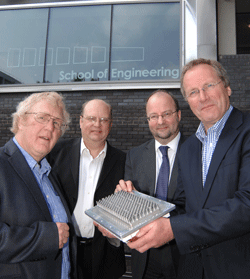- News
1 July 2011
Warwick spins off Anvil to develop smaller, more efficient SiC-based power converters
The new company Anvil Semiconductors Ltd has been launched at the UK’s University of Warwick, created by its technology commercialization subsidiary Warwick Ventures Ltd. The firm aims to develop smaller, more efficient power converters using silicon carbide (SiC) power semiconductor switches.
Anvil has received an investment of £25,000 from the Early Advantage Fund of West Midlands-focused privately owned commercial fund manager Midven Ltd, as well as £125,000 from private investors Minerva (the Midlands network of entrepreneurs, venturers and angels). The firm has also since (in June) been awarded an R&D grant from the UK’s national innovation agency Technology Strategy Board for the project ‘Commercial SiC Power Electronics’.
 SiC devices are able to withstand higher voltages and currents and are 10 times faster than traditional silicon devices, says Anvil. However, they are also currently 10 times more expensive to produce, which has prevented the material being widely adopted.
SiC devices are able to withstand higher voltages and currents and are 10 times faster than traditional silicon devices, says Anvil. However, they are also currently 10 times more expensive to produce, which has prevented the material being widely adopted.
The semiconductors being developed by Anvil are expected to enable significant improvements in operating efficiency, size and cost when used in power converters such as those found in electric cars, photovoltaic cells and wind turbines. The market for such devices is estimated to be $25bn worldwide.
Picture: Left to right: Peter Ward (Anvil CEO); professor Phil Mawby (University of Warwick School of Engineering); Kevin Marks (business development manager at Warwick Ventures); Stuart LeCornu (lead investor from Minerva).
Anvil’s technology has been developed by CEO Dr Peter Ward and professor Phil Mawby’s team at the University of Warwick’s School of Engineering. The firm will be using five patents licensed from the university to refine and commercialize the devices. It will also be the first private company to use the £10m semiconductor cleanroom funded through the Science City Research Alliance (SCRA) of the universities of Birmingham and Warwick. SCRA is funded by the Birmingham Science City initiative (a region-wide partnership of public sector, businesses and the research base), via Advantage West Midlands (AWM) and others.
“Semiconductors have such a vast array of uses in electronic equipment. The technological advances we are introducing to their design have huge potential to reduce our overall energy consumption, through improving the efficiency of electric cars, renewable power generation and the Grid,” says Mawby. “Now Anvil gives us a route to get this technology to market,” he adds.
“Two factors have stopped the introduction of silicon carbide into the market place: the cost of the substrate and the production of a high-quality switch,” notes Warwick Ventures’ business development manager Kevin Marks. “Anvil’s technology offers potential solutions to both these barriers,” he adds.
“Anvil builds on the impressive research track record of Phil Mawby and the substantial investment made in the Science City Cleanroom,” says Dr Andrew Muir, a director of Midven and investment director of the Early Advantage Fund. “Our investment, alongside the Minerva business angels, will support the progress of this business, which has great growth potential and the ability to become a world leader,” he believes.
Anvil will be launching a further funding round later this year as it moves towards producing prototype devices.
www2.warwick.ac.uk/services/ventures
